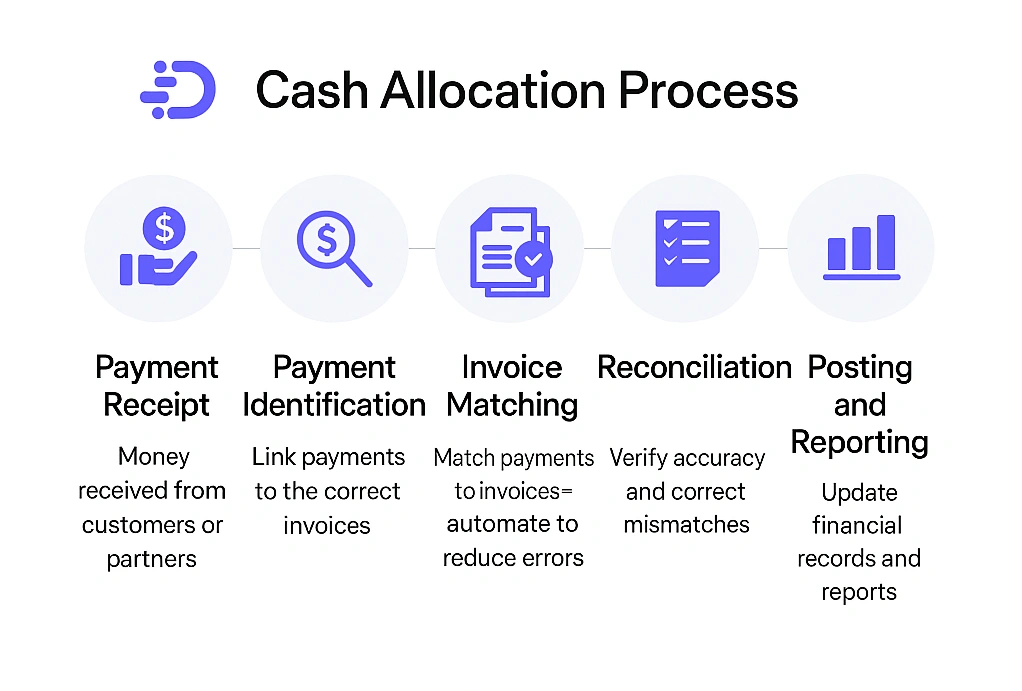Cash allocation is the process of matching incoming payments to the correct customer invoices to ensure accurate financial records and effective cash flow management.
When companies optimize cash allocation, they can improve their cash flow. This makes operations more efficient. It helps businesses of all sizes keep a clear view of their finances.
Using modern software for debtor management is a big help. It automates cash allocation. This reduces the time spent on paperwork and gives a more accurate picture of your finances. It supports better cash flow optimization.
The cash allocation process involves steps like payment receipt, payment identification, and invoice matching. These steps help keep your finances in order and improve your financial health.
Payment receipt is the first step. It's when you officially get money from customers, vendors, or partners. This step is important because it starts the process of tracking your money.
After receiving payments, you need to identify them. This means linking payments to the right invoices. Sometimes, payments might be wrong or unclear. It's important to fix these issues quickly to keep your financial reports accurate.
The last step is matching payments with invoices. This can be hard, especially for big companies with lots of invoices. Using cash allocation software can make this easier. It helps match payments and invoices without a lot of manual work.
Reconciliation checks if all payments match the financial records. It finds and fixes any issues from the matching phase. A detailed cash reconciliation helps avoid mistakes and improves financial accuracy.
Posting and reporting mean adding reconciled payments to financial records. Accurate records are vital for good financial reports. When done right, your financial statements show your company's real cash situation.

Cash allocation is more than just tracking money. It affects many financial parts of your business.
It helps you see how much cash you have. This lets you make quick, smart choices and deal with money problems.
With better visibility, you can use resources well. This keeps your business running smoothly.
A good cash allocation system watches how customers pay. It cuts down on how long it takes to get paid. This makes managing money easier. It also lowers the chance of running out of cash.
It makes your financial records more reliable. This builds trust with customers. It also makes it easier to fix any payment issues.
Accurate cash allocation helps you predict money flows. This guides your business decisions. It keeps your business liquid and ready for changes.
Find the right balance in cash in your portfolio. Financial advisors suggest keeping about 10% of your portfolio in cash. This ensures you have enough money for unexpected costs and still have chances to invest.
Having too much cash can slow down your growth. Cash doesn't earn much interest. So, it's important to find the right mix for your needs.
Your cash balance should match your personal situation, lifestyle, and how much risk you're willing to take. It's important to make sure your cash management fits with your long-term investment plans. Some investors also consider other investment options like physical gold to diversify their portfolio and protect wealth over time.
Checking your cash balance regularly can improve your investment results. It helps you grow your money while keeping it safe from sudden financial issues.

Using DepositFix can make your cash management better. It helps track payments and invoices easily. This gives you up-to-date info on your finances.
DepositFix's features make managing cash smoother. It helps manage debtors better and improves how you allocate funds. This makes your financial processes more efficient.
DepositFix cuts down the time spent on manual reconciliations. This lets your team work on important tasks instead. Contact us today and your financial system more effective and cash flow better managed.
When you use systematic processes and software, you can see your cash flow better. This helps cut down on unpaid bills and reduces mistakes in your finances.
The role of cash allocation in your business is huge. It helps you manage your money well. With good financial strategies, you can balance your cash flow. This balance keeps your finances safe and lets you take advantage of new opportunities.
Cash optimization is not just a money trick; it's a vital part of your business plan. When you focus on good cash allocation, your business will grow and stay strong, even when the economy changes.
Discover the hidden automation in your payment, billing and invoicing workflows. Talk to our experts for a free assement!
